独家大学英美文学乔治奥威尔介绍
- 格式:ppt
- 大小:272.00 KB
- 文档页数:20
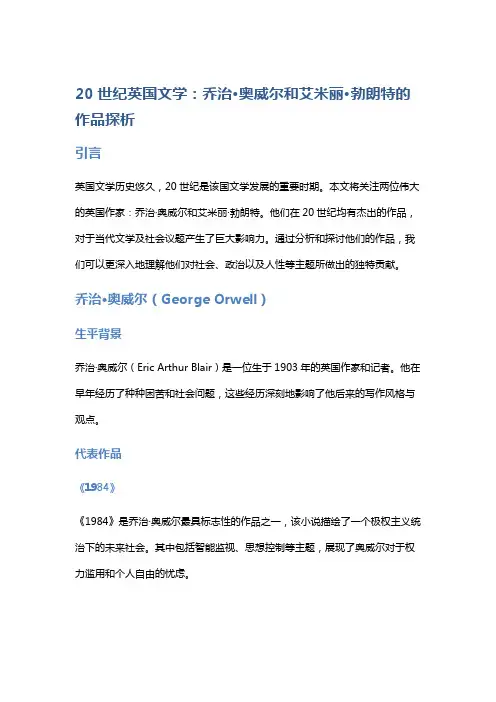
20世纪英国文学:乔治·奥威尔和艾米丽·勃朗特的作品探析引言英国文学历史悠久,20世纪是该国文学发展的重要时期。
本文将关注两位伟大的英国作家:乔治·奥威尔和艾米丽·勃朗特。
他们在20世纪均有杰出的作品,对于当代文学及社会议题产生了巨大影响力。
通过分析和探讨他们的作品,我们可以更深入地理解他们对社会、政治以及人性等主题所做出的独特贡献。
乔治·奥威尔(George Orwell)生平背景乔治·奥威尔(Eric Arthur Blair)是一位生于1903年的英国作家和记者。
他在早年经历了种种困苦和社会问题,这些经历深刻地影响了他后来的写作风格与观点。
代表作品《1984》《1984》是乔治·奥威尔最具标志性的作品之一,该小说描绘了一个极权主义统治下的未来社会。
其中包括智能监视、思想控制等主题,展现了奥威尔对于权力滥用和个人自由的忧虑。
《动物庄园》《动物庄园》是一部寓言小说,以农场上发生的斗争为背景,旨在暗喻着苏联共产主义体制下的腐败和剥削。
通过动物们反抗压迫者的故事,奥威尔揭示了权力斗争和革命运动中普遍存在的问题。
影响乔治·奥威尔以其独特的笔触和思想深度影响了后世作家及读者群体。
他对政治和社会问题敏锐的洞察力,塑造出鲜明的文学形象,并引发了对人类本性、个人自由与权力之间关系等议题的深刻思考。
艾米丽·勃朗特(Emily Brontë)生平背景艾米丽·勃朗特(Emily Brontë)是19世纪中期英国文学中最重要并备受赞誉的女作家之一。
她生于1818年,在一个有文化才华的家族中长大,并与姐姐夏洛特·勃朗特和安妮·勃朗特共同创作了众多重要的作品。
代表作品《呼啸山庄》《呼啸山庄》是艾米丽·勃朗特唯一的小说,被誉为英国文学史上最伟大的爱情小说之一。
故事讲述了两个家族之间复杂的关系、矛盾的爱情以及对人性黑暗面的深入探索。

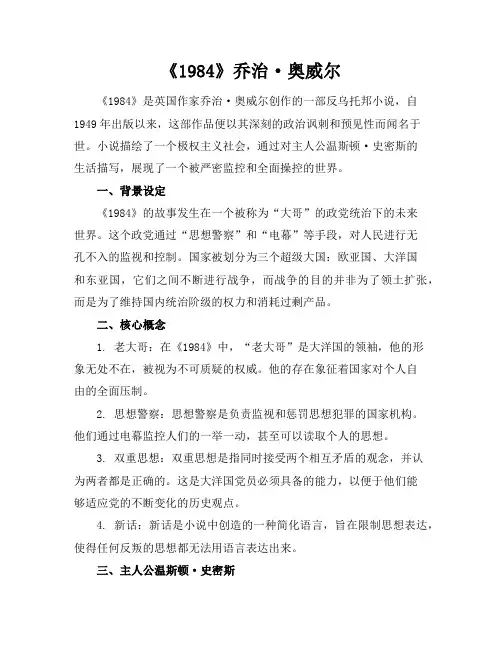
《1984》乔治·奥威尔《1984》是英国作家乔治·奥威尔创作的一部反乌托邦小说,自1949年出版以来,这部作品便以其深刻的政治讽刺和预见性而闻名于世。
小说描绘了一个极权主义社会,通过对主人公温斯顿·史密斯的生活描写,展现了一个被严密监控和全面操控的世界。
一、背景设定《1984》的故事发生在一个被称为“大哥”的政党统治下的未来世界。
这个政党通过“思想警察”和“电幕”等手段,对人民进行无孔不入的监视和控制。
国家被划分为三个超级大国:欧亚国、大洋国和东亚国,它们之间不断进行战争,而战争的目的并非为了领土扩张,而是为了维持国内统治阶级的权力和消耗过剩产品。
二、核心概念1. 老大哥:在《1984》中,“老大哥”是大洋国的领袖,他的形象无处不在,被视为不可质疑的权威。
他的存在象征着国家对个人自由的全面压制。
2. 思想警察:思想警察是负责监视和惩罚思想犯罪的国家机构。
他们通过电幕监控人们的一举一动,甚至可以读取个人的思想。
3. 双重思想:双重思想是指同时接受两个相互矛盾的观念,并认为两者都是正确的。
这是大洋国党员必须具备的能力,以便于他们能够适应党的不断变化的历史观点。
4. 新话:新话是小说中创造的一种简化语言,旨在限制思想表达,使得任何反叛的思想都无法用语言表达出来。
三、主人公温斯顿·史密斯温斯顿·史密斯是《1984》中的核心人物,他在真理部工作,负责篡改历史记录,以符合党的最新指示。
尽管生活在严密的监控之下,温斯顿仍然对自由和真相抱有渴望。
他的内心反叛逐渐引导他走向了对党的反抗之路,但这条道路充满了危险和背叛。
四、爱情的禁果在《1984》的极权世界里,爱情被视为一种可能引发反叛情感的危险事物。
温斯顿与朱丽娅的相遇和相恋,成为了他对体制反抗的一部分。
他们的爱情是秘密的,每一次的约会都是一场与思想警察的较量。
在党的眼中,性是用于繁殖的工具,而非表达个人情感的方式。
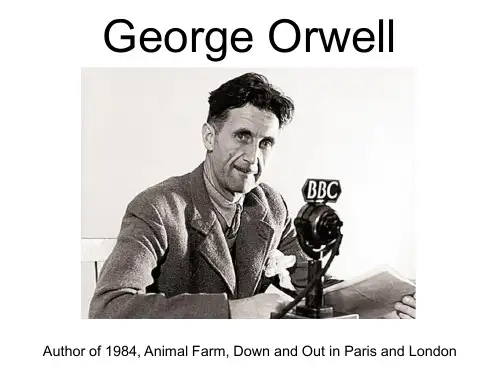

乔治奥威尔英国作家与的作者乔治奥威尔:英国作家与政治观察家乔治奥威尔(George Orwell)是20世纪英国最着名的作家之一,同时也是一位重要的政治观察家。
他以其独特的写作风格和对社会政治的深刻洞察力而著称。
在他的作品中,他关注并揭示了权力、压迫、自由和真相的重要性。
本文将介绍乔治奥威尔的生平背景、主要作品以及对社会和政治的深远影响。
一、生平背景乔治奥威尔(本名埃里克·亚瑟·布莱尔,Eric Arthur Blair)于1903年6月25日出生在英国印度一个中产阶级家庭。
他的父亲是一位英国官员,母亲是在印度教育学校任教的人。
由于父亲的工作关系,乔治在他的早年时光里经历了英属印度和英国的两种文化背景,这对他的成长产生了深远的影响。
二、主要作品1. 《动物庄园》《动物庄园》是乔治奥威尔最著名的作品之一。
这部博览了社会政治和革命的寓言小说,以一群农场动物的故事揭示了权力滥用和暴政的真相。
通过动物庄园这个象征性的社会,奥威尔暗示了社会阶级的分化和领导者腐败的危险性。
这部小说成为了对集权主义和极权主义的强烈批评,深刻地触动了世人的心弦。
2. 《1984》《1984》被认为是奥威尔最伟大的作品之一,也是他最为知名的小说之一。
这部小说以极权主义社会下的恐怖统治为背景,揭示了个人自由和隐私权受到侵犯的危险。
故事中的主人公温斯顿·史密斯在一个叫做“大哥”的独裁者统治下开始质疑现实,并试图反抗。
通过对思想控制和真相扭曲的描述,这本书为后世对政府监控和个人自由的关注提供了书写的基础。
三、对社会和政治的影响乔治奥威尔的作品不仅仅是文学作品,更是对社会和政治的深度观察。
他对于权力的批评和对个人自由的呼喊影响了世界各地的读者和思想家。
尤其是《1984》中描述的极权主义社会,在许多国家和时期仍然有着深刻的现实意义。
奥威尔的笔下,警示了人们对于权力滥用和真相扭曲的警觉。
他提醒人们要保持批判思维,并时刻警惕独裁统治的威胁。

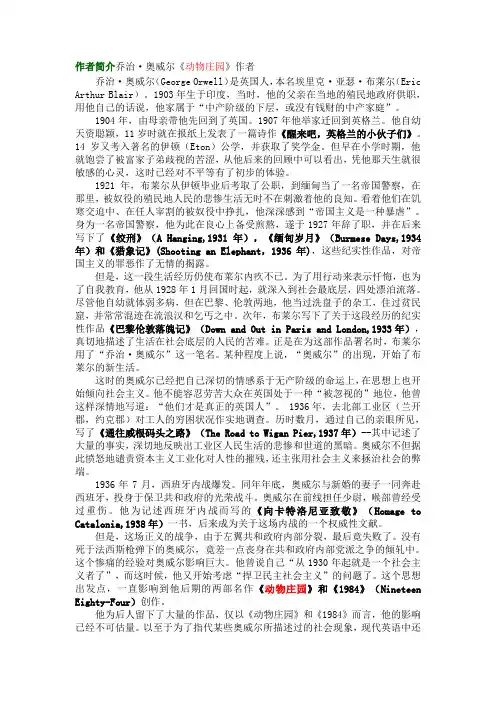
作者简介乔治·奥威尔《动物庄园》作者乔治·奥威尔(George Orwell)是英国人,本名埃里克·亚瑟·布莱尔(Eric Arthur Blair)。
1903年生于印度,当时,他的父亲在当地的殖民地政府供职,用他自己的话说,他家属于“中产阶级的下层,或没有钱财的中产家庭”。
1904年,由母亲带他先回到了英国。
1907年他举家迁回到英格兰。
他自幼天资聪颖,11岁时就在报纸上发表了一篇诗作《醒来吧,英格兰的小伙子们》。
14岁又考入著名的伊顿(Eton)公学,并获取了奖学金。
但早在小学时期,他就饱尝了被富家子弟歧视的苦涩,从他后来的回顾中可以看出,凭他那天生就很敏感的心灵,这时已经对不平等有了初步的体验。
1921年,布莱尔从伊顿毕业后考取了公职,到缅甸当了一名帝国警察,在那里,被奴役的殖民地人民的悲惨生活无时不在刺激着他的良知。
看着他们在饥寒交迫中、在任人宰割的被奴役中挣扎,他深深感到“帝国主义是一种暴虐”。
身为一名帝国警察,他为此在良心上备受煎熬,遂于1927年辞了职,并在后来写下了《绞刑》(A Hanging,1931年),《缅甸岁月》(Burmese Days,1934年)和《猎象记》(Shooting an Elephant,1936年),这些纪实性作品,对帝国主义的罪恶作了无情的揭露。
但是,这一段生活经历仍使布莱尔内疚不已。
为了用行动来表示忏悔,也为了自我教育,他从1928年1月回国时起,就深入到社会最底层,四处漂泊流落。
尽管他自幼就体弱多病,但在巴黎、伦敦两地,他当过洗盘子的杂工,住过贫民窟,并常常混迹在流浪汉和乞丐之中。
次年,布莱尔写下了关于这段经历的纪实性作品《巴黎伦敦落魄记》(Down and Out in Paris and London,1933年),真切地描述了生活在社会底层的人民的苦难。
正是在为这部作品署名时,布莱尔用了“乔治·奥威尔”这一笔名。

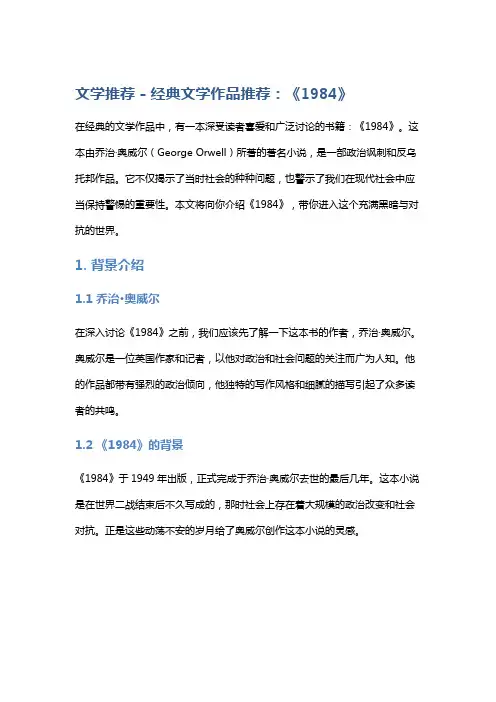
文学推荐 - 经典文学作品推荐:《1984》在经典的文学作品中,有一本深受读者喜爱和广泛讨论的书籍:《1984》。
这本由乔治·奥威尔(George Orwell)所著的著名小说,是一部政治讽刺和反乌托邦作品。
它不仅揭示了当时社会的种种问题,也警示了我们在现代社会中应当保持警惕的重要性。
本文将向你介绍《1984》,带你进入这个充满黑暗与对抗的世界。
1. 背景介绍1.1 乔治·奥威尔在深入讨论《1984》之前,我们应该先了解一下这本书的作者,乔治·奥威尔。
奥威尔是一位英国作家和记者,以他对政治和社会问题的关注而广为人知。
他的作品都带有强烈的政治倾向,他独特的写作风格和细腻的描写引起了众多读者的共鸣。
1.2 《1984》的背景《1984》于1949年出版,正式完成于乔治·奥威尔去世的最后几年。
这本小说是在世界二战结束后不久写成的,那时社会上存在着大规模的政治改变和社会对抗。
正是这些动荡不安的岁月给了奥威尔创作这本小说的灵感。
2. 小说情节概述2.1 故事背景《1984》的故事设定在一个虚构的未来社会,大部分欧洲已经被一个名为“英社党”的政权所控制。
故事的主人公是一个名叫温斯顿·史密斯(Winston Smith)的小职员,他生活在被更名为“」海瑟威”的伦敦市。
2.2 温斯顿的生活与思想温斯顿过着单调的生活,他将工作、睡眠和消费组织得井井有条。
然而,他内心深处却充满了对这个统治体制的怀疑和反抗。
他始终希望能够找到真相,追寻过去被抹去的历史和被篡改的事实。
2.3 温斯顿与朱莉娅在故事的进展中,温斯顿邂逅了另一个具有异议的年轻女性朱莉娅(Julia)。
他们之间逐渐产生了感情,并共同展开了对抗政权的努力。
然而,他们的行动并没有逃脱政府的监视,并最终被捕。
2.4 对抗与思想改造温斯顿被送入了一个名为“思想改造中心”的地方,在那里,他经历了各种身心折磨和心灵摧残。
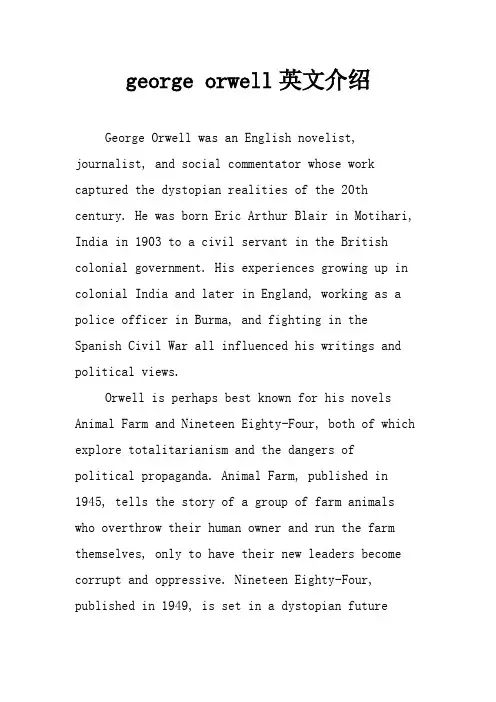
george orwell英文介绍George Orwell was an English novelist, journalist, and social commentator whose work captured the dystopian realities of the 20th century. He was born Eric Arthur Blair in Motihari, India in 1903 to a civil servant in the British colonial government. His experiences growing up in colonial India and later in England, working as a police officer in Burma, and fighting in the Spanish Civil War all influenced his writings and political views.Orwell is perhaps best known for his novels Animal Farm and Nineteen Eighty-Four, both of which explore totalitarianism and the dangers ofpolitical propaganda. Animal Farm, published in 1945, tells the story of a group of farm animals who overthrow their human owner and run the farm themselves, only to have their new leaders become corrupt and oppressive. Nineteen Eighty-Four, published in 1949, is set in a dystopian futurewhere the government has complete control over every aspect of citizens' lives.Throughout his writing career, Orwell championed democratic socialism and criticized totalitarianism in all its forms. Despite being a committed socialist, Orwell was critical of the Soviet Union and its Communist regime, which he saw as a perversion of socialism. This led to him being shunned by some on the left and criticized by some on the right.Orwell was also a prolific journalist, writing for a variety of newspapers and magazines throughout his career. He was particularly interested in social and political issues, and his non-fiction work often focused on poverty, inequality, and the struggles of the working class.One of Orwell's most famous essays is "Politics and the English Language," in which he criticized the use of cliches, jargon, and meaningless wordsin political discourse. He argued that this kind of language was used to obscure the truth and manipulate the masses, and that clear, conciselanguage was vital for democracy to function properly.Orwell died in 1950 at the age of 46 from tuberculosis. His legacy is still felt today in his iconic novels and essays, which continue to provide insight into the dangers of totalitarianism and the importance of freedom and democracy. In 2020, his novel Nineteen Eighty-Four experienced a surge in sales and popularity due to its depiction of a dystopian society where the government controls every aspect of citizens' lives, resonating with many people during the COVID-19 pandemic and subsequent lockdowns.Overall, George Orwell was a complex and influential figure in 20th century literature and politics, whose work continues to be widely read and studied today.。
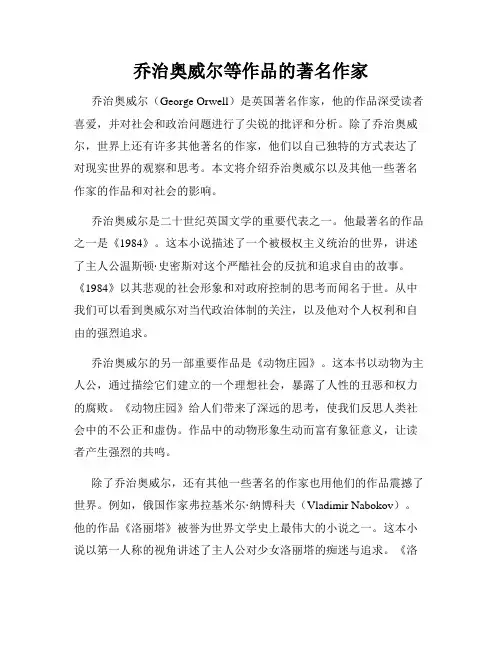
乔治奥威尔等作品的著名作家乔治奥威尔(George Orwell)是英国著名作家,他的作品深受读者喜爱,并对社会和政治问题进行了尖锐的批评和分析。
除了乔治奥威尔,世界上还有许多其他著名的作家,他们以自己独特的方式表达了对现实世界的观察和思考。
本文将介绍乔治奥威尔以及其他一些著名作家的作品和对社会的影响。
乔治奥威尔是二十世纪英国文学的重要代表之一。
他最著名的作品之一是《1984》。
这本小说描述了一个被极权主义统治的世界,讲述了主人公温斯顿·史密斯对这个严酷社会的反抗和追求自由的故事。
《1984》以其悲观的社会形象和对政府控制的思考而闻名于世。
从中我们可以看到奥威尔对当代政治体制的关注,以及他对个人权利和自由的强烈追求。
乔治奥威尔的另一部重要作品是《动物庄园》。
这本书以动物为主人公,通过描绘它们建立的一个理想社会,暴露了人性的丑恶和权力的腐败。
《动物庄园》给人们带来了深远的思考,使我们反思人类社会中的不公正和虚伪。
作品中的动物形象生动而富有象征意义,让读者产生强烈的共鸣。
除了乔治奥威尔,还有其他一些著名的作家也用他们的作品震撼了世界。
例如,俄国作家弗拉基米尔·纳博科夫(Vladimir Nabokov)。
他的作品《洛丽塔》被誉为世界文学史上最伟大的小说之一。
这本小说以第一人称的视角讲述了主人公对少女洛丽塔的痴迷与追求。
《洛丽塔》以其独特的写作风格和对禁忌主题的大胆探索而闻名,引起了广泛的争议和讨论。
还有美国作家约翰·斯坦贝克(John Steinbeck),他的作品《愤怒的葡萄》展现了农民工的困境和社会不公。
这本小说通过细腻的描写和刻画赢得了广泛的赞誉。
斯坦贝克关注社会中的弱势群体,他的作品呼吁对社会不平等进行反思并采取行动。
除了这些著名的作家,世界各地还有许多其他的文学巨匠,他们以自己独特的方式影响着读者。
无论是乔治奥威尔的政治批判,纳博科夫的震撼性故事,还是斯坦贝克的社会关怀,他们的作品都在文学史上占有重要地位。
George Orwell奥威尔简介1903-1950 小说:Down and Out in Paris and London巴黎伦敦落魄记;Homage to Catalonia向坎塔罗尼亚致敬;Animal Farm兽园;Nineteen Eighty-Four散文集:Dickens,Dali and Others狄更斯,达里及其他;Shooting on Elephant and Other Essays猎象记及其他;The Collected Essays,Journalism and Letters of George Orwell in Four V olumes奥威尔散文,新闻写作及书信集名文:Lear Tolstoy and The Foolpseudonym of Eric Arthur Blairborn 1903, Motīhāri, Bengal, Indiadied Jan. 21, 1950, LondonGeorge Orwell.English novelist, essayist, and critic famous for his novels Animal Farm (1945) and Nineteen Eighty-four (1949), the latter a profoundanti-Utopian novel that examines the dangers of totalitarian rule.Born Eric Arthur Blair, Orwell never entirely abandoned his original name, but his first book (Down and Out in Paris and London) appeared as the work of George Orwell (the surname he derived from the beautiful River Orwell in East Anglia). In time his nom de plume became so closely attached to him that few people but relatives knew his real name was Blair. The change in name corresponded to a profound shift in Orwell's life-style, in which he changed from a pillar of the British imperial establishment into a literary and political rebel.He was born in Bengal, into the class of sahibs. His father was a minor British official in the Indian civil service; his mother, of French extraction, was the daughter of an unsuccessful teak merchant in Burma. Their attitudes were those of the “landless gentry,” as Orwell later called lower-middle-class people whose pretensions to social status had little relation to their income. Orwell was thus brought up in an atmosphere of impoverished snobbery. After returning with his parents to England, he was sent in 1911 to a preparatory boarding school on the Sussex coast, where he was distinguished among the other boys by his poverty and his intellectual brilliance. He grew up a morose, withdrawn, eccentric boy, and he was later to tell of the miseries of those years in his posthumously published autobiographical essay, Such, Such Were the Joys (1953).Orwell won scholarships to two of England's leading schools, Winchester and Eton, and chose the latter. He stayed from 1917 to 1921. Aldous Huxley was one of his masters, and it was at Eton that he published his first writing in college periodicals. Instead of accepting a scholarship to a university, Orwell decided to follow family tradition and, in 1922, went to Burma as assistant district superintendent in the Indian Imperial Police. He served in a number of country stations and at first appeared to be a model imperial servant. Yet from boyhood he had wanted to become a writer, and when he realized how much against their will the Burmese were ruled by the British, he felt increasingly ashamed of his role as a colonial police officer. Later he was to recount his experiences and his reactions to imperial rule in his novel Burmese Days and in two brilliant autobiographical sketches, “Shooting an Elephant” and “A Hanging,” classics of expository prose.In 1927 Orwell, on leave to England, decided not to return to Burma, and on Jan. 1, 1928, he took the decisive step of resigning from the imperial police. Already in the autumn of 1927 he had started on a course of action that was to shape his character as a writer. Having felt guilty that the barriers of race and caste had prevented his mingling with the Burmese, he thought he could expiate some of his guilt by immersing himself in the life of the poor and outcast people of Europe. Donning ragged clothes, he went into the East End of London to live in cheap lodging houses among labourers and beggars; he spent a period in the slums of Paris and worked as a dishwasher in French hotels and restaurants; he tramped the roads of England with professional vagrants and joined the people of the London slums in their annual exodus to work in the Kentish hopfields.These experiences gave Orwell the material for Down and Out in Paris and London (1933), in which actual incidents are rearranged into something like fiction. The book's publication in 1933 earned him some initialliterary recognition. Orwell's first novel, Burmese Days (1934), established the pattern of his subsequent fiction in its portrayal of a sensitive, conscientious, and emotionally isolated individual who is at odds with an oppressive or dishonest social environment. The main character of Burmese Days is a minor administrator who seeks to escape from the dreary and narrow-minded chauvinism of his fellow British colonialists in Burma. His sympathies for the Burmese, however, end in an unforeseen personal tragedy. The protagonist of Orwell's next novel, A Clergyman's Daughter(1935), is an unhappy spinster who achieves a brief and accidental liberation in her experiences among some agricultural labourers. Keep the Aspidistra Flying (1936) is about a literarily inclined bookseller's assistant who despises the empty commercialism and materialism of middle-class life but who in the end is reconciled to bourgeois prosperity by his forced marriage to the girl he loves.Orwell's revulsion against imperialism led not only to his personal rejection of the bourgeois life-style but to a political reorientation as well. Immediately after returning from Burma he called himself an anarchist and continued to do so for several years; during the 1930s, however, he began to consider himself a socialist, though he was too libertarian in his thinking ever to take the further step—so common in the period—of declaring himself a communist.Orwell's first socialist book was an original and unorthodox political treatise entitled The Road to Wigan Pier(1937). It begins by describing his experiences when he went to live among the destitute and unemployed miners of northern England, sharing and observing their lives; it ends in a series of sharp criticisms of existing socialist movements. It combines mordant reporting with a tone of generous anger that was to characterize Orwell's subsequent writing.By the time The Road to Wigan Pier was in print, Orwell was in Spain; he went to report on the Civil War there and stayed to join the Republican militia, serving on the Aragon and Teruel fronts and rising to the rank of second lieutenant. He was seriously wounded at Teruel, damage to his throat permanently affecting his voice and endowing his speech with a strange, compelling quietness. Later, in May 1937, after having fought in Barcelona against communists who were trying to suppress their political opponents, he was forced to flee Spain in fear of his life. The experience left him with a lifelong dread of communism, first expressed in the vivid account of his Spanish experiences, Homage to Catalonia (1938), which many consider one of his best books.Returning to England, Orwell showed a paradoxically conservative strain in writing Coming Up for Air (1939), in which he uses the nostalgicrecollections of a middle-aged man to examine the decency of a past England and express his fears about a future threatened by war and fascism. When war did come, Orwell was rejected for military service, and instead he headed the Indian service of the British Broadcasting Corporation (BBC). He left the BBC in 1943 and became literary editor of the Tribune, a left-wing socialist paper associated with the British Labour leader Aneurin Bevan. At this period Orwell was a prolific journalist, writing many newspaper articles and reviews, together with serious criticism, like his classic essays on Charles Dickens and on boys' weeklies and a number of books about England (notably The Lion and the Unicorn, 1941) that combined patriotic sentiment with the advocacy of a libertarian, decentralist socialism very much unlike that practiced by the British Labour Party.In 1944 Orwell finished Animal Farm,a political fable based on the story of the Russian Revolution and its betrayal by Joseph Stalin. In this book a group of barnyard animals overthrow and chase off their exploitative human masters and set up an egalitarian society of their own. Eventually the animals' intelligent and power-loving leaders, the pigs, subvert the revolution and form a dictatorship whose bondage is even more oppressive and heartless than that of their former human masters. (“All animals are equal, but some animals are more equal than others.”) At first Orwell had difficulty finding a publisher for this small masterpiece, but when it appeared in 1945 Animal Farm made him famous and, for the first time, prosperous.Animal Farm was one of Orwell's finest works, full of wit and fantasy and admirably written. It has, however, been overshadowed by his last book, Nineteen Eighty-four (1949), a novel he wrote as a warning after years of brooding on the twin menaces of Nazism and Stalinism. The novel is set in an imaginary future in which the world is dominated by three perpetually warring totalitarian police states. The book's hero, the Englishman Winston Smith, is a minor party functionary in one of these states. His longing for truth and decency leads him to secretly rebel against the government, which perpetuates its rule by systematically distorting the truth and continuously rewriting history to suit its own purposes. Smith has a love affair with a like-minded woman, but then they are both arrested by the Thought Police. The ensuing imprisonment, torture, and reeducation of Smith are intended not merely to break him physically or make him submit but to root out his independent mental existence and his spiritual dignity until he can love only the figure he previously most hated: the apparent leader of the party, Big Brother. Smith's surrender to the monstrous brainwashing techniques of his jailers is tragic enough, but the novel gains much of its power from the comprehensive rigour with which it extendsthe premises of totalitarianism to their logical end: the love of power and domination over others has acquired its perfected expression in the perpetual surveillance and omnipresent dishonesty of an unassailable and irresistible police state under whose rule every human virtue is slowly being suborned and extinguished. Orwell's warning of the potential dangers of totalitarianism made a deep impression on his contemporaries and upon subsequent readers, and the book's title and many of its coined words and phrases (“Big Brother is watching you,” “newspeak,” “doublethink”) became bywords for modern political abuses.Orwell wrote the last pages of Nineteen Eighty-four in a remote house on the Hebridean island of Jura, which he had bought from the proceeds of Animal Farm.He worked between bouts of hospitalization for tuberculosis, of which he died in a London hospital in January 1950.Additional ReadingPeter Davison (ed.), Complete Works of George Orwell, 20 vol. (1986–98), contains all of the author's writings. Two authorized biographies of Orwell are Michael Shelden, Orwell (1991); and Bernard Crick, George Orwell: A Life, new ed. (1992). Two other important biographical works are by Peter Stansky and William Abrahams, The Unknown Orwell(1972), and Orwell: The Transformation (1979). Critical studies include George Woodcock, The Crystal Spirit(1966, reprinted 1984); John Atkins, George Orwell: A Literary Study, new ed. (1971); Richard Rees, George Orwell: Fugitive from the Camp of Victory(1961); Robert A. Lee, Orwell's Fiction (1969); Keith Alldritt, The Making of George Orwell: An Essay in Literary History(1969); Raymond Williams (compiler), George Orwell: A Collection of Critical Essays(1974); and Alex Zwerdling, Orwell and the Left(1974). Jeffrey Meyers (ed.), George Orwell: The Critical Heritage (1975), provides a comprehensive selection of critical responses to the author; and J. Rodden, The Politics of Literary Reputation: The Making and Claiming of ‘St. George' Orwell(1989), analyzes the development of his reputation. Daphne Patai, The Orwell Mystique: A Study in Male Ideology (1989), offers a persuasive critique of the author's work from a feminist perspective. Roger Fowler, The Language of George Orwell(1995), examines Orwell's practice of language.。
第6单元乔治•奥威尔George Orwell (1903-1950) (乔治·奥威尔)1. Life(生平)George Orwell was an essayist, critic and writer. In 1921, he graduated from Eton College in Britain. In 1927, he successively stayed in London and Paris, living a poor life. His first novel Down and Out in Paris and London described the poor workers’ life in a capitalist society. From 1936 to 1937, he participated in the Spanish Civil War and went against fascism. Apart from novels, Orwell wrote many comments and prose. His writing style was simple and clean, without artificiality.乔治·奥威尔,散文家,评论家和小说家。
1921年毕业于英国伊顿公学。
1927年,先后在巴黎和伦敦闲居,生活贫困。
他的第一部小说《巴黎伦敦落魄记》描述了资本主义社会中穷苦工人的生活。
奥威尔自1936至1937年参加西班牙内战,反对法西斯主义。
奥威尔除写小说外,还写过不少评论和散文。
他的文笔干净纯朴,没有矫揉做作的文人笔墨。
2. Major Works(主要作品)Animal Farm 《兽园》Nineteen Eighty-Four 《一九八四年》Dickens, Dali and Others 《狄更斯、达里及其他》3. Selected Works(选读作品)◆Lear, Tolstoy and the Fool《李尔,托尔斯泰和傻瓜》From 1903 to 1904, Tolstoy wrote an essay titled Shakespeare and the Drama, which criticized Shakespeare. Thus Orwell wrote this article to dismiss the criticism of Shakespeare. He thought that the main differences of Tolstoy and Shakespeare lie in the fact that the former believed in religion and pursed the afterlife while the latter focused on the happiness of present life. This view is very pertinent. Tolstoy criticized Shakespeare because he thought that Shakespeare song high praise of nobility and looked down on ordinary people. It is interesting to note that some writers held opposite opinions. For example, the 17th century new classical poet Dryden thought that Shakespeare didn’t match the classical nobility.列·托尔斯泰在1903至1904年间写了题为《莎士比亚及其戏剧》的短文,批评莎士比亚。
乔治·奥威尔
乔治·奥威尔
姓名:乔治·奥威尔
原名:埃里克阿瑟布莱尔
性别:男
出生年月:1903年
国籍:印度
乔治·奥威尔原名埃里克阿瑟布莱尔(eric arthur blair),1903年生于印度。
1907年他举家迁回到英格兰。
1917年,他进入伊顿公学。
1921年后来到缅甸加入indian imperial police,1928年辞职。
随后的日子里他贫病交加,此间他当过、书店店员,直到1940年,他成为new english weekly的小说评论员,他才有了稳定的收入养家糊口。
1936年间,他访问了兰开夏郡和约克郡,1936年底,他来到西班牙参加西班牙内战,其间他受伤。
二战期间(1940-1943),他为bbs eastern service工作,并在此间写了大量政治和文学评论。
1945年起他成为observer的战地记者和machester evening news的固定撰稿人。
1945年,他出版了《动物农场》,1949年出版了《1984》。
奥威尔患有肺结核,于1950年死去。